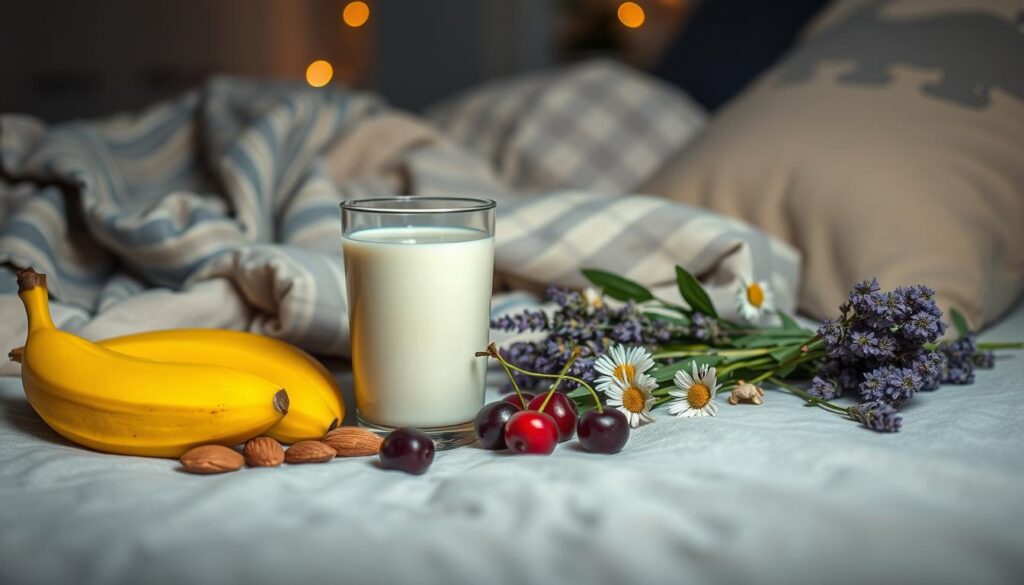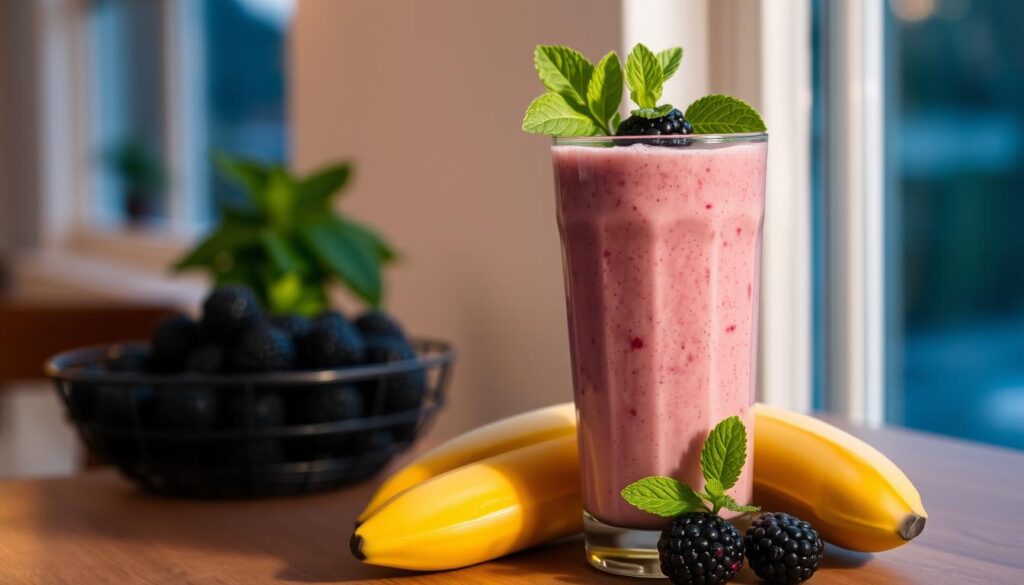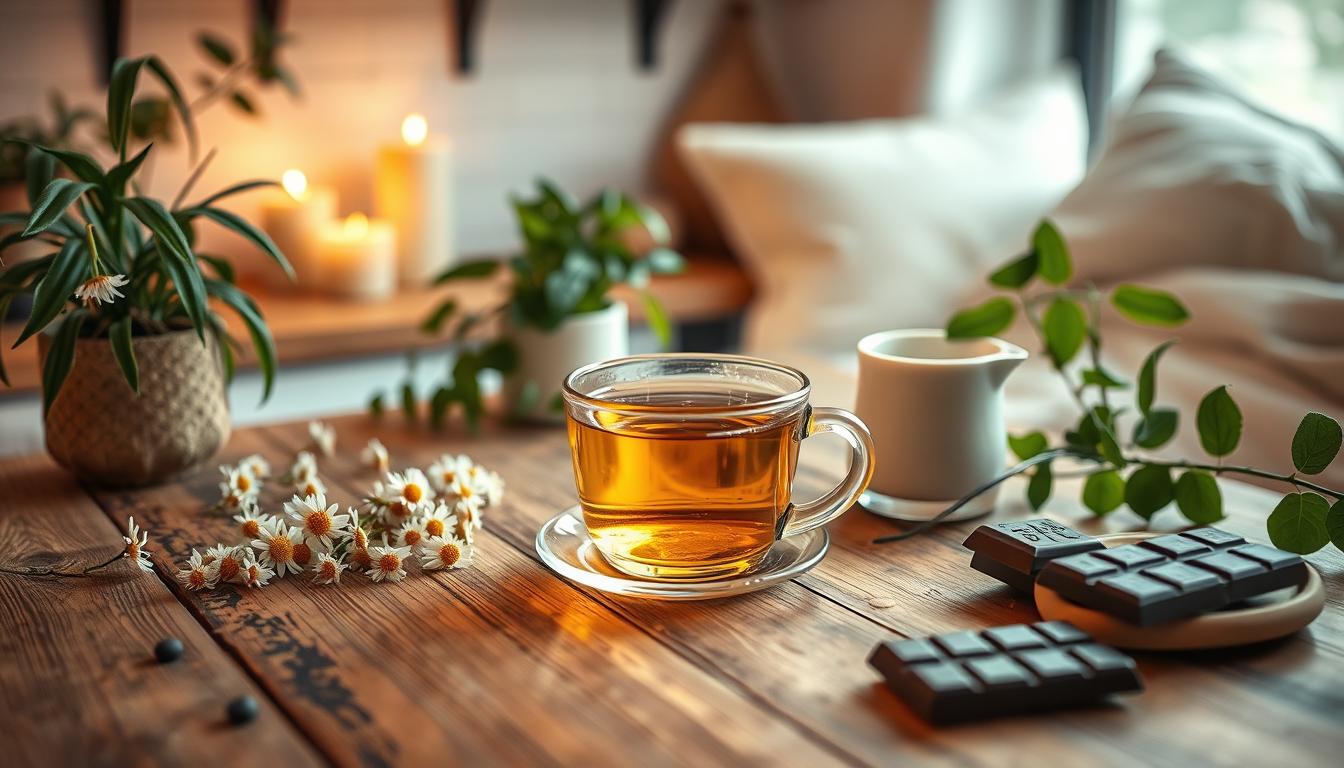Powerful Recipes to Improve Your Sleep – Ever wondered why some nights you toss and turn, while others you drift off effortlessly? The secret could be on your plate.
In our fast-paced world, achieving quality sleep can feel like chasing a dream. But what if the key to unlocking restful nights lies right in your kitchen?
Sleep hygiene isn’t just about a comfy mattress or a dark room. It’s also about what you eat and drink before bedtime. The right nutrients can transform your sleep patterns, turning restless nights into rejuvenating slumbers.
Just as Spanish cuisine reflects artistic heritage, your evening meals can paint a masterpiece of relaxation with Powerful Recipes to Improve Your Sleep.
Let’s explore how simple bedtime routines and natural remedies can pave the way for better sleep. From stress-relief techniques to Powerful Recipes to Improve Your Sleep, we’re about to embark on a journey to sweeter dreams.
Key Takeaways
- Evening eating habits significantly impact sleep quality
- Certain foods contain sleep-promoting compounds
- Bedtime routines are crucial for consistent sleep patterns
- Natural remedies can enhance relaxation before bed
- Avoiding stimulants is key to uninterrupted sleep
Understanding the Science Behind Sleep and Nutrition
Sleep is key to our health, taking up a third of our day. Good sleep habits lead to better sleep and rest. Studies link diet and sleep, showing the need for healthy habits for good rest.
The Role of Nutrients in Sleep Quality
Certain nutrients help improve sleep quality. Melatonin, made in the pineal gland, is crucial for sleep and our body clock. Foods high in melatonin include:
- Plant-based foods
- Meats
- Mushrooms
- Fruits like pineapples, oranges, and bananas
Eating these foods boosts melatonin levels, helping us sleep better.
How Diet Affects Sleep Cycles
Our diet greatly affects our sleep. Those who don’t eat well sleep less. But, eating more fruits and veggies can improve sleep and reduce insomnia.
Key Sleep-Promoting Compounds
Many nutrients are important for good sleep:
| Nutrient | Benefits | Food Sources |
|---|---|---|
| Tryptophan | Improves sleep quality | Turkey, eggs, cheese |
| Magnesium | Supports better sleep | Nuts, seeds, leafy greens |
| Vitamin D | Enhances sleep duration | Fatty fish, egg yolks, fortified foods |
| Omega-3 fatty acids | Improves sleep efficiency | Salmon, walnuts, flaxseeds |
Adding these nutrients to your diet with Powerful Recipes to Improve Your Sleep can help you sleep better.
This supports a healthy lifestyle.
Why Your Evening Eating Habits Matter for Better Sleep
Your evening eating habits are key to a good night’s sleep. What and when you eat before bed affects your sleep quality. Research shows that eating before bed can have both good and bad effects, depending on your choices.

A study of 793 participants found some interesting facts about late-night eating and sleep:
- 56.8% of participants ate within 3 hours of bedtime
- 27.8% of late-night eaters reported waking up at night
- 25.1% had trouble falling asleep
To better your bedtime routine and sleep with Powerful Recipes to Improve Your Sleep, follow these tips:
- Finish your last meal 3-4 hours before bed
- Choose light, sleep-friendly snacks if needed
- Avoid high-fat, sugary, or spicy foods close to bedtime
- Limit caffeine and alcohol in the evening
| Recommended Bedtime Snacks | Foods to Avoid |
|---|---|
| Vegetables with hummus | Chips |
| Fruits with dark chocolate | Ice cream |
| Apple with peanut butter | Candy bars |
| Greek yogurt | High-sugar drinks |
Adjusting your evening eating habits can help you sleep better. Good sleep hygiene begins with mindful eating before bed.
Essential Nutrients in Powerful Recipes to Improve Your Sleep
Eating the right foods can help you sleep better. Certain nutrients are key for regulating sleep cycles and promoting relaxation.Let’s look at some important nutrients in Powerful Recipes to Improve Your Sleep and their sources for better sleep.
Melatonin-Rich Foods
Melatonin is a hormone that controls our sleep-wake cycle. Eating foods high in melatonin can improve sleep quality. Tart cherries are a great source of melatonin.
Drinking tart cherry juice daily can increase sleep time and quality in people with insomnia.
Tryptophan Sources
Tryptophan is an amino acid that helps make serotonin, a melatonin precursor. Turkey, milk, and cheese are good sources of tryptophan. Malted milk before bed can also reduce sleep interruptions, studies show.

Magnesium and Other Vital Minerals
Magnesium is important for muscle relaxation and calming nerves. Leafy greens, nuts, and seeds are rich in magnesium. A study found that magnesium, melatonin, and zinc helped older adults with insomnia sleep better.
| Nutrient | Food Sources | Sleep Benefits |
|---|---|---|
| Melatonin | Tart cherries, bananas, almonds | Regulates sleep-wake cycle |
| Tryptophan | Turkey, milk, cheese | Aids serotonin production |
| Magnesium | Leafy greens, nuts, seeds | Relaxes muscles and nerves |
Adding these nutrient-rich foods to your diet can naturally improve sleep. Consistency is important when changing your diet for better sleep.
3 Powerful Recipes to Improve Your Sleep and Relax Before Bed
Looking for natural ways to improve your sleep? Try these three Powerful Recipes to Improve Your Sleep to relax before bed and sleep better. Each dish has ingredients that help you sleep well, making it a tasty way to rest.
Banana-Blackberry Smoothie for Deep Sleep
This Powerful Recipe to Improve Your Sleep is a calming drink for bedtime.
Bananas and blackberries are good for muscle relaxation and sleep quality. Greek yogurt adds melatonin and tryptophan for easier sleep.

Lemon-Sesame Salmon with Avocado
Salmon is full of omega-3s, vitamin D, and B6, all good for sleep.
Omega-3s help with serotonin, and vitamin D keeps your sleep cycle healthy. Avocado adds magnesium and creaminess.
Bulgur and Kale Salad with Honey-Yogurt Dressing
This salad is full of sleep helpers.
Kale has calcium for melatonin, and almonds add magnesium. The honey-yogurt dressing is sweet and helps you sleep.
| Recipe | Key Sleep-Promoting Ingredients | Benefits |
|---|---|---|
| Banana-Blackberry Smoothie | Bananas, Blackberries, Greek Yogurt | Muscle relaxation, Antioxidants, Melatonin production |
| Lemon-Sesame Salmon | Salmon, Avocado | Omega-3s, Vitamin D, Serotonin boost |
| Bulgur and Kale Salad | Kale, Almonds, Yogurt | Calcium, Magnesium, Melatonin support |
Have these Powerful Recipes to Improve Your Sleep as a light dinner 2-4 hours before bed.
This lets your body digest and get ready for sleep. Eating well, with lots of veggies, fruits, and proteins, along with Powerful Recipes to Improve Your Sleep, also helps you sleep better.
Timing Your Evening Meals for Optimal Sleep
When it comes to sleep, what you eat and when you eat it matters. Eating too late can mess up your sleep, but not eating enough before bed isn’t good either. Studies say eating your last meal 4-6 hours before bed is best for sleep.
For dinner, choose something light like fish with a small side or a salad with grains. If you’re still hungry before bed, try a snack with tryptophan, like milk or turkey.
Research shows eating dinner at 6 p.m. instead of 10 p.m. can help burn fat while you sleep. This timing fits with your body’s natural sleep cycle, leading to better sleep.
| Meal | Recommended Timing | Benefits |
|---|---|---|
| Breakfast | 6:00 – 9:45 a.m. | Lower rates of weight gain |
| Lunch | Before 3:00 p.m. | Better weight loss results |
| Dinner | Around 6:00 p.m. | Increased fat burning overnight |
Sticking to a meal schedule within an hour each day can improve your health and sleep. By following these tips and adding them to your bedtime routine, you’re on your way to a great night’s sleep.
Additional Sleep-Supporting Ingredients to Consider
Are you looking for natural ways to sleep better? You’re not alone. Over 60 million Americans have trouble sleeping well. Let’s look at some ingredients that can help you sleep better.
Natural Sleep-Inducing Herbs
Herbs have been used for centuries to relax. Valerian root, in doses of 300-600 mg, can improve sleep quality. Ashwagandha also helps by lowering cortisol levels and improving sleep.
Calming Teas and Beverages
Drinking the right thing before bed can change everything. Chamomile, passionflower, and holy basil teas can help you fall asleep faster. Tart cherry juice is also a surprising sleep aid, adding 84 minutes of sleep for adults.
Healthy Carbohydrate Options
Choosing the right carbs can also help your sleep. Oatmeal or jasmine rice a few hours before bed can increase tryptophan and serotonin. But, avoid sugary drinks as they can disrupt sleep.
Timing is key when using these natural sleep aids. Avoid caffeine 4-6 hours before bed. And skip the nightcap – alcohol might help you fall asleep but can disrupt your sleep later. With these tips, you’re on your way to better sleep!
Creating a Relaxing Pre-Bed Routine with Food
A peaceful bedtime routine can greatly improve your sleep. Adding food to your evening can be a tasty way to relax. Let’s look at some delicious options that also help with stress.
Begin your routine an hour or two before bed. This allows your body to digest and signals sleep time. Try a warm cup of chamomile tea. It can calm your mind and body.
For a light snack, try a small bowl of oatmeal. Oats have magnesium and melatonin, which help with sleep. Add pistachios or pumpkin seeds for more sleep benefits.
If you like fruit, kiwis are great. Eating two kiwis before bed can improve sleep. Or, a small handful of tart cherries can boost melatonin.
- Chamomile tea for relaxation
- Oatmeal with pistachios or pumpkin seeds
- Kiwis or tart cherries for melatonin
Preparing these snacks can be relaxing. Take your time, breathe deeply, and focus. This mindful approach helps your mind relax and get ready for sleep.
By making this food-focused bedtime routine a habit, you’re not just feeding your body. You’re also telling it it’s time to unwind and sleep well.
Foods to Avoid Before Bedtime
Good sleep hygiene is key for better sleep. What you eat before bed matters a lot. Let’s look at foods that can mess with your sleep and why you should skip them.
Stimulants and Their Effects
Some foods have stimulants that make it hard to sleep. Caffeine is a big one. Stay away from chocolate, coffee, tea, and energy drinks 4-6 hours before bed. Even some cheeses, like aged cheddar, have tyramine, which keeps you alert.
Heavy Foods That Disrupt Sleep
Spicy and fatty foods can cause discomfort and acid reflux when you lie down. Curries, for example, have capsaicin that raises your body temperature. This makes it tough to fall asleep. Foods high in sugar, like ice cream, can cause blood sugar crashes during sleep. This increases cortisol levels and messes with your rest.
- Salty snacks (avoid 2-3 hours before bed)
- Heavy meals (finish 4 hours before bedtime)
- Alcohol (causes fragmented sleep)
- Nicotine (acts as a stimulant)
To get better sleep, choose sleep-promoting foods instead. Cherries, raw honey, and bananas can help you sleep naturally. Remember, drinking water is good, but not too much before bed to avoid midnight trips to the bathroom.
Conclusion
Many adults struggle with tiredness, with 84% feeling fatigued during the week. Our look at 3 powerful recipes to improve your sleep and relax before bed offers a tasty solution. By adding sleep-supporting foods to your diet with Powerful Recipes to Improve Your Sleep, you’re taking a big step towards better sleep and health.
What you eat affects how well you sleep. The Mediterranean diet, full of sleep-promoting nutrients, leads to better sleep and fewer nighttime issues. Our Powerful Recipes to Improve Your Sleep – the Banana-Blackberry Smoothie, Lemon-Sesame Salmon, and Bulgur and Kale Salad – bring these nutrients in tasty ways.
Healthy lifestyle habits are key for great sleep. Regular exercise, sunlight, and staying hydrated help regulate your sleep cycle. By mixing these habits with our sleep-friendly recipes, you’re on a path to better rest. Sweet dreams are ahead as you start this journey to improved sleep and relaxation.

